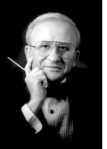What do famous musicians say about each other?
By David Amos
 SAN DIEGO–We know the great musicians of the past from the legacy of wonderful music they left us. But, we may not be familiar with their writing and comments. Some composers were quiet, shy, and introverted, while others were notorious conversationalists, humorists, writers, and commentators on many social issues of the time.
SAN DIEGO–We know the great musicians of the past from the legacy of wonderful music they left us. But, we may not be familiar with their writing and comments. Some composers were quiet, shy, and introverted, while others were notorious conversationalists, humorists, writers, and commentators on many social issues of the time.
Here are a few interesting and insightful comments which I hope you will find amusing, enlightening, and informative; they may also give you a fresh perspective into composers familiar to you only through their music. And if you enjoy these, I would like to recommend that you obtain for your library the book from which they were extracted, Music Lovers Quotations by Helen Exley.
PETER I. TCHAIKOWSKY: To hear Mozart’s music is to feel one has accomplished some good deed. It is difficult to say precisely wherein this good influence lies, but undoubtedly, is beneficial; the longer I live and the better I know him, the more I love music.
CHARLES GOUNOD: The great geniuses suffer, and must suffer, but they need not complain; they have known intoxication unknown to the rest of us and, if they have wept tears of sadness, they have poured tears of ineffable joy. That in itself is a heaven for which one never pays for what it is worth.
IGOR STRAVINSKY: I know that twelve notes in each octave and the varieties of rhythm offer me opportunities that all of human genius will never exhaust.
RICHARD WAGNER: I believe in God, Mozart, and Beethoven.
LUDWIG VAN BEETHOVEN: I am inclined to think that a hunt for folk songs is better than a manhunt of the heroes who are so highly extolled.
ANTONIN DVORAK: In the Negro melodies of America I discover a great and noble school of music… These beautiful and varied themes are the products of the soil. They are the folk songs of the United States. All the great musicians have borrowed from the songs of the common people….I have myself gone to the simple tunes of the Bohemian peasants for hints in my most serious work…The Negro melodies are pathetic, tender, passionate, melancholy, solemn, religious, bold, merry, gay, gracious.
PABLO CASALS: For the past eighty years I have started each day in the same manner. It is not a mechanical routine but something essential to my daily life. I go to the piano, and I play two preludes and fugues of Bach. I can not think of doing otherwise. It is a sort of benediction on the house. But that is not its only meaning to me. It is a rediscovery of the world of which I have the joy of being a part. It fills me with awareness of the wonder of life, with a feeling of the incredible marvel of being a human being.
GEORG SOLTI: Mozart makes you believe in God-much more than going to church- because it can not be by chance that such a phenomenon arrives into the world and then passes after thirty six years, leaving behind such an unbounded number of unparalleled masterpieces.
HECTOR BERLIOZ: When I hear a piece of music…I feel a delicious pleasure in which reason has no part. The habit of analysis comes afterwards to give birth to admiration. The emotion increasing in proportion to the energy or the grandeur of the ideas of the composer soon produces a strange agitation in the circulation of the blood; tears, which generally indicate the end of the paroxysm, often indicate a progressive state of it, leading to something still more intense. In this case, I have spasmodic contractions of the muscles, a trembling in all my limbs, a complete torpor of the feet and hands, a partial paralysis of the nerves of sight and hearing. I no longer hear, I scarcely hear—vertigo—a semi-swoon.
ANOTHER TCHAIKOWSKY QUOTE: I grew up in a quiet spot and was saturated from earliest childhood with the wonderful beauty of Russian popular song. I am therefore passionately devoted to every expression of the Russian spirit…As to this national element in my work, its affinity with folk songs in some of my melodies and harmonies comes from my early years in the country.
And to conclude, there is an old Jewish legend about the origin of praise. After God created mankind, says the legend, He asked the angels what they thought of the world He had made. “Only one thing is lacking”, they said. “It is the sound of praise to the Creator”. So, the story continues, “God created music, the voice of birds, the whispering wind, the murmuring ocean, and planted melody in people’s hearts”.
*
Amos is conductor of the Tifereth Israel Community Orchestra (TICO) and has guest conducted orchestras around the world.